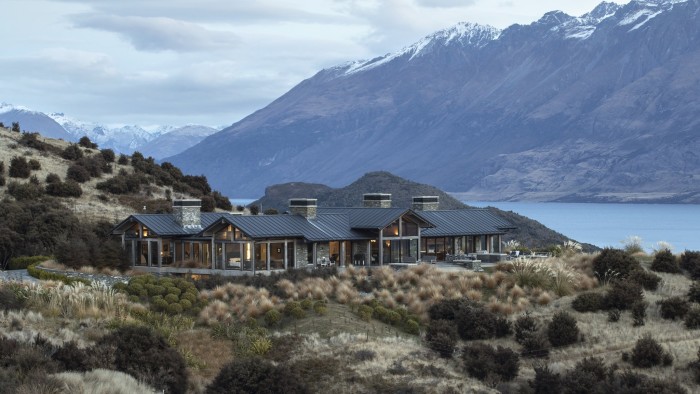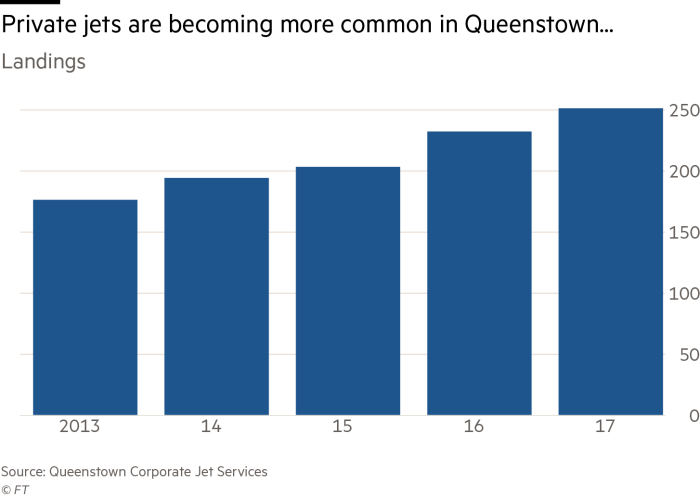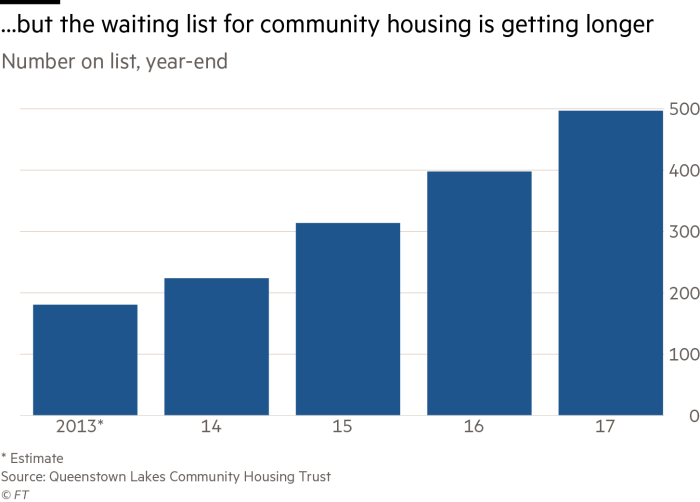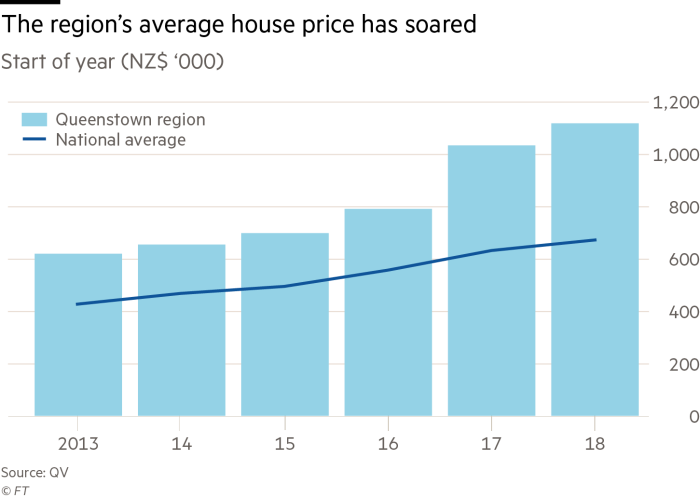‘Billionaire bolt-holes’ under threat in New Zealand

Simply sign up to the Property sector myFT Digest -- delivered directly to your inbox.
It is billed as the ultimate in luxury, complete with a games room, 12-seater cinema and wine cellar. But the NZ$33m mountain lodge perched on the edge of Lake Wakatipu also boasts a reinforced concrete and steel structure and can function “off grid” for peace of mind.
Twin Peaks View is being marketed to the global super-rich, who have flocked to New Zealand’s Queenstown in search of spectacular scenery and a bolt-hole in case of global catastrophe. But a pending national law restricting foreigners from buying homes threatens to halt the region’s luxury economy boom and stem the influx of overseas billionaires.
“This law would dry up the secondary housing market,” says Peter Campbell, founder of Triple Star, the construction company that built Twin Peaks View.
“This won’t just affect builders and real estate agents, this will hit the entire local economy — housekeepers, landscapers, insurance brokers, car concierge services and boutique wine shops.”
Mr Campbell says one foreign client, who has invested NZ$60m ($43m) in the region, has already cancelled a building project because of the proposed change.
The bill’s supporters, however, point to an escalating housing crisis in the Queenstown region, with many families struggling to find homes.
Triple Star is among dozens of companies and local officials urging the government of Jacinda Ardern to backtrack and allow rich foreigners to continue buying luxury housing to support the economy. At parliamentary hearings this week, critics, including many local multimillionaires, argued that the proposed law was: “xenophobic”; would damage New Zealand’s global reputation for openness; and would not solve the housing problem.

The Labour-led coalition argues that foreign buyers are contributing to a housing crisis in New Zealand, which a recent survey showed has the worst homelessness problem in the OECD. The issue formed a key plank of Labour’s platform in September’s election, which focused on tackling inequality.
The shortage of affordable housing in New Zealand is mirrored in western nations — including the UK, Australia and Canada — where low interest rates have supercharged house prices, making it difficult for people on low incomes to buy homes. The influx of foreign home buyers has provoked a public backlash at a time when wages are stagnating and housing supply remains low.
Few places on earth highlight the growing divide between the super-rich and low-income workers better than Queenstown, a picturesque town surrounded by the Southern Alps. About 32,000 people live in the town and the surrounding lakes region, which has the highest average house price in the country at NZ$1.16m, according to the QV House Price Index.
The influx of wealthy foreigners, who include technology guru Peter Thiel, disgraced US news anchor Matt Lauer and hedge fund pioneer Julian Robertson, has generated an economic boom for builders, real estate agents and luxury goods sellers.

Chinese billionaires are also seeking to get in on the act. Jack Ma, Alibaba’s founder, has said he wants to buy a house in the country — and that 20 of his colleagues have already retired in the country in their mid-forties.
Luxury estates and lakeside homes with spectacular mountain views dot the Queenstown region, which formed the backdrop of the Lord of the Rings films. Many mansions boast “panic rooms” to keep their occupants safe from intruders.
The number of private jets landing at Queenstown airport has increased 43 per cent over the past five years to 251 last year. If there were more parking spaces for the flock of Gulfstream, Falcon and Global Express jets ferrying rich owners into the region, landings would be even higher.
“We turned six private jets away last month due to space restrictions,” says Robin Leach, director of Queenstown corporate jet services. “Our clients are high net worth individuals from all over the world. Most of them have property here already or are looking for property.”

But while Queenstown’s luxury economy is booming, the pressure on local housing is acute, particularly for young families and young people who migrate to the region to work in tourism. The community housing waiting list hit a record 496 in December, a rise of 175 per cent in three years.
Local newspapers have reported on the wretched living conditions faced by service industry workers in substandard rental properties. One modest Queenstown property, nicknamed the “Castle of Fernhill”, had up to 30 people living in nine bedrooms, according to TV New Zealand.
“It is not just low-income people facing difficulty,” says Nicky Mason, a co-ordinator at Happiness House, a community support centre. “We are seeing more middle-income families struggling to find accommodation. I would like to see a foreign property ban to provide some sort of breathing space.”
The local council opposes the bill, saying it would damage a thriving luxury home industry, threaten many homeowners with negative equity and cut off the valuable investments and philanthropic donations made by overseas buyers.
“Foreign people with high net worth generally get involved in some sort of investment activity in the district and are the very first people to put their hands in their pockets for philanthropic projects,” says Jim Boult, Queenstown’s mayor. “They are some of our most valued residents.”
The council recommends amending the bill to enable foreigners to continue buying properties above a set price. Overseas buyers could also be obliged to make a philanthropic contribution, it says.
Michael Nock, a Hong Kong-based financier who hired a helicopter to find his own Queenstown bolt-hole after the global financial crisis, invites local and international artists to use a studio at his property.
“Wealthy buyers are positive for the economy,” he says. “I’m not sure the current thinking to ban foreign buyers is all that sensible. The Chinese money and US billionaires are buying houses that the average Kiwis wouldn’t.”
Comments